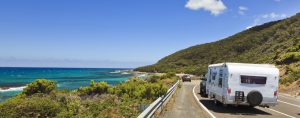Tips on buying a caravan
A caravan is a large financial purchase, with so many things to consider. Here are our top tips on buying a caravan and getting on the road travelling in 2021.

Budget
It’s a good idea to set your budget in advance. Decide how much you want and can spend and stick to this when shopping around. Organising finance, if needed, in advance is also a good idea as having that organised will assist in the purchase process. There are other costs that you may want to consider and allow for upfront:
- caravan insurance costs
- storage costs (if applicable)
- additional facilities to be added
- if second hand, repair costs
- tow vehicle upgrades (if applicable)
Size and use
Who will be using your caravan? For example, is it just you and your partner or will you be taking your family of 6 on every trip or your maybe it’s just you and your 3 dogs. Knowing the caravan usage in regards to who will use it will help determine the size that you will need and/or if you will need any extra’s like a full annex.
Also knowing how often you will use your caravan and where you plan on going will help to plan with your caravan requirements. If you will be travelling in hot seasons and locations, then you may want air conditioning. If you plan to do remote area travelling, you may want more van facilities and extras included or to add later. Using your van a few times a year on shorter adventures, versus spending half of the year travelling up the east coast will also help you determine what size and type of van you want.
Vehicle towing
Another very important factor is your tow vehicle and the weight it can tow. You want to make sure you purchase a van that your tow vehicle can tow, unless you plan on buying a new towing vehicle.
Updates may also need to be made to your existing vehicle. If it hasn’t been used to tow a caravan before, such as electric brakes, this also needs to be included in the budget.
Also take into account your experience, if any, in towing a caravan. If you aren’t experienced, you may want to consider doing a course to get you up to skill.
Write a must-have and must-not-have list
Before heading out to the caravan and camping shows or caravan sale yards, try and write a list of must-haves and must-not-haves that you want from your van. On your must –have list you may include things like an interior bathroom, storage, bunk beds, a specific size or off road capabilities. The must-not-have list may include a pop top van, interior bathroom, a certain sleeping layout, or even the interior styling.
This list will no doubt change as you progress looking at caravans, but it can start to assist by setting specific requirements.
Things to consider if buying second hand
Many people will buy their first caravan second hand. There are many things to consider and ask when you go to inspect a caravan. You may also want to take along a torch, damp meter, a tape measure and smart phone to take photos to refer to later. Here are some more considerations:
Things to ask:
- The age of the caravan and where is it stored
- Caravan documentation such as the van’s service and ownership history and current weighbridge, gas, and electrical certificates.
Things to look for on the outside of the caravan:
- Rust, including underneath the van which is why you may need a torch
- Any dents, scratches, cracks, or other marks
- The condition of the tyres
- The condition of the windows and doors, the seals and if they open and close properly
- Any fix it jobs that could be concealing bigger issues
- Check the condition of the axle, gas and electrical components and the wiring and pipework under the van
- Check if the caravan’s handbrake works effectively, and the tow hitch moves freely and the jockey wheel winds up and down easily
- Does the awning open and close as it should?
Things to look for inside the caravan?
- Signs of dampness, this is why a damp meter is handy
- The condition of the floor
- Appliances such as the stove, fridge and microwave are working well
- That all drawers and cupboards are in good condition
- The water sources work well
- The electrics such as lights, work well
- Is there a working smoke detector and a fire extinguisher?
Obviously you need to be flexible when buying a caravan, new or second hand. For second hand purchases, keep in mind that some things are more expensive to repair, such as rust and dampness. When purchasing new, you should allow for ordering times; currently some caravan distributors and/or manufacturers have a wait of over 6 months for brand new caravans.
Some may choose to hire a caravan or two for holidays, to test out what they do and don’t like, before making the final purchase.
Also remember your patience when buying a caravan. Do your research, fine tune your must-have list and keep looking until you find your perfect match, within your budget!
Resources:
myrigadventures.com/10-tips-for-buying-a-new-or-second-hand-caravan/
www.caravancampingsales.com.au/editorial/details/ultimate-caravan-buying-guide-119602/
